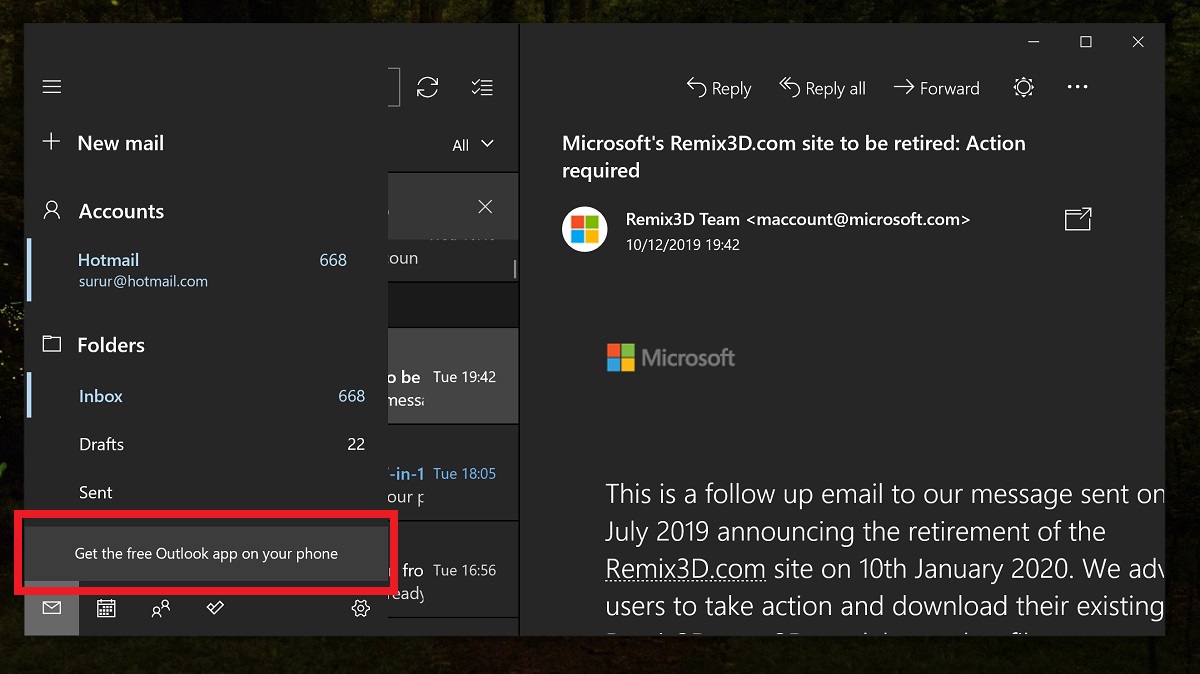Microsoft Inserts Non-Removable Ads Into Mail and Calendar Apps
Microsoft confirmed there's no way to get rid of them.
Get Tom's Hardware's best news and in-depth reviews, straight to your inbox.
You are now subscribed
Your newsletter sign-up was successful
Microsoft has started to include banner ads in two of its most popular Universal Windows Platform (UWP) applications: Mail and Calendar. It seems that there's no way for users to get rid of the ads.
The ads currently recommend using the mobile versions of Gmail and Outlook apps, depending on whether you’re using a Gmail or Outlook.com address in the Windows Mail app. However, it's likely Microsoft will eventually post ads from other advertisers after they test the waters.
One issue, pointed out by MSPowerUser, is that the ads recommending mobile apps continue showing in the desktop applications even if you’ve already installed those mobile apps.
Showing ads in apps is not something new. Google shows ads from third-party advertisers on its native mobile applications, including Gmail and Google Assistant. However, some may feel a little cheated that after paying for a Windows license (whether outright or via a purchased device).
Microsoft has not only made these ads non-removable, but it also seems to have no intention of backtracking.
“The ads within the app itself will be displayed regardless of which email address you use it with. It is not removable, but you can submit it as a suggestion within the Feedback Hub on Windows 10 here: https://msft.it/6012TVPXG ," Microsoft said, according to MSPowerUser.
There may be some ways to block these ads in the future either at the Windows hosts file level or a Windows registry, but it'll likely require playing a cat-and-mouse game with Microsoft blocking those attempts in the future with each new Windows update.
Get Tom's Hardware's best news and in-depth reviews, straight to your inbox.
Blocking OS ads at the router level could also be a solution, but Microsoft may also find a way to block that in the future if enough users bother with it. And the vendor could also make the apps that serve ads unusable if the users block the ads from showing somehow.
As Windows 10 becomes increasingly common, Microsoft may find it convenient to issue such 'take it or leave it' ultimatums to users by breaking critical Windows functionality if users decide to block certain Windows trackers or ads.
Lucian Armasu is a Contributing Writer for Tom's Hardware US. He covers software news and the issues surrounding privacy and security.
-
InvalidError When people grew wary of Internet Exploiter, they switched to Firefox and Chrome. If M$ pisses off mail users, that will drive them to alternatives such as Thunderbird.Reply -
setx ReplyMicrosoft may find it convenient to issue such 'take it or leave it' ultimatums to users...
Aren't they doing exactly that with Windows10?
And it's the main reason people don't want to "upgrade" Windows 7.
